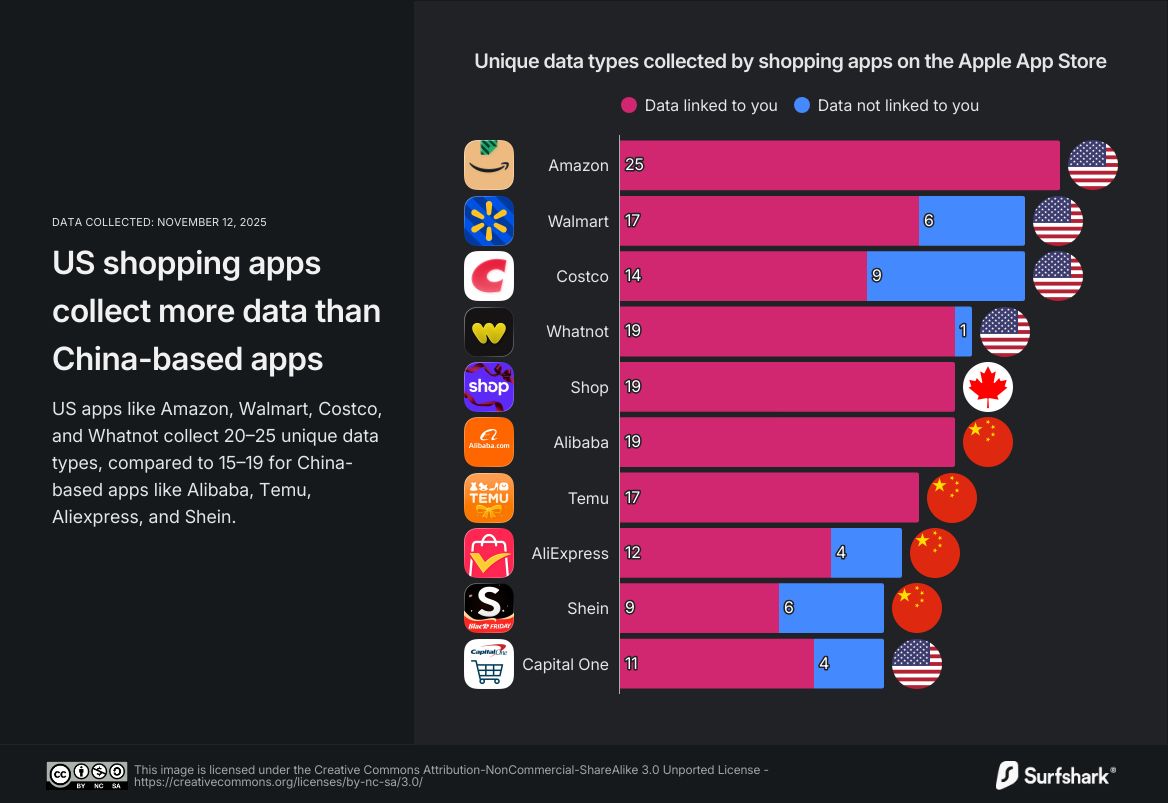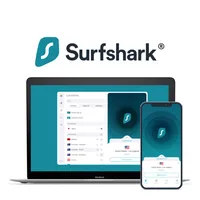Forget Beijing, it’s US shopping apps that are sucking up your privacy − and Amazon is the most data-hungry
Surfshark's latest research warns that US apps are outstripping Chinese apps in data collection

Sign up for breaking news, reviews, opinion, top tech deals, and more.
You are now subscribed
Your newsletter sign-up was successful
- Surfshark says US apps are the real data hoarders
- Amazon leads the way, also collecting users’ voices and audio
- Data could be used to create users’ digital replicas
Are you scrolling through US shopping apps to find the best deals ahead of the Black Friday frenzy? Then you might want to know their reputation for data harvesting is wretched − outpacing even that of their often-criticised Chinese counterparts.
This is the finding from the latest research conducted by Surfshark. The cybersecurity company examined the data collection practices of the 10 most popular shopping apps in the US, finding that the four most aggressive data harvesters are all based in the US, surpassing Chinese competitors in the breadth of data collected.
Surprise, surprise: Amazon takes the spot as the most data-hungry app, collecting 25 unique types of data in the categories scrutinised. Walmart and Costco follow with 23 each, while Whatnot collects 20. In stark contrast, China's largest collector, Alibaba, collects “only” 19 types of data, followed by Temu with 17.
The creator of one of the best VPNs analysed 35 different types of data gathered for purposes such as product personalization, third-party advertising, and data analysis. The team also assessed how many categories were ticked by each app by examining public information on the Apple App Store.
All of the apps analyzed vacuum vast amounts of users’ personal details, including payment details, used ID and search history, with most also collecting phone numbers, photos, and videos.
However, only Amazon and Walmart collect information classified as 'sensitive,' and that can include political opinions, ethnic origin, and biometric data. Together with Whatnot and Alibaba, it’s unsettling to know they could also collect voice or audio recordings.
A dangerous trade-off

Although it is reasonable to assume that Amazon, the Western world's largest marketplace, gobbles an insatiable amount of data to sharpen its personalisation algorithms − including strictly personal data of all sorts − the results reveal a worrying potential.
And while the research itself is based on standardised categories that do not represent a uniform level of risk, the study alerts users that they may not be aware of what sort of information they actually give away when they open an app − or where it could end.
Surfshark warns that continuous tracking, permanent storage of digital data, and security risks such as data leaks and breaches could expose information to third parties and malicious individuals.
Additionally, health-related data could be used in ultra-targeted advertising to exploit people at their most vulnerable. "The leakage of particularly sensitive data, such as political opinions or health data, can damage a person's reputation and financial situation, as health data rarely changes and can be used by insurance companies and healthcare providers," Luis Costa, research lead at Surfshark, explains.
Shopping apps can also gather sensitive information by tracking how users interact with them − and not only when users choose to share them.
"By analysing your searches, purchases, and location, apps can learn about your interests and habits," Costa tells TechRadar. "Sometimes, they could combine this information to guess personal details like your political views or health status, often to personalise your app experience."
Ultimately, with more information exposed, it becomes easier to replicate a digital profile of any person, thereby putting everyone at risk, the expert warns.
How to stay safe
Your last-minute Black Friday or Christmas bargain may not be worth these hidden costs.
For a better-safe-than-sorry experience, simply do not download the apps − or at least read the privacy policy and strengthen your account security, for example, by using two-factor authentication.
And if you are looking for some tools to help you take more control over the data you leave online, now it's the best time to do so. An early Black Friday VPN deal has already slashed the price of Surfshark One, the company's handy security suite. Here are all the details:
Surfshark One: $2.19 per month – 88% off + 3 months free
Surfshark has already slashed its prices for Black Friday. Starter is Surfshark's cheapest price plan, but Surfshark One is where the real deal is. Besides an excellent VPN product and Alternative ID, here's what you get with Surfshark One over Starter:
✅ Full antivirus built in
✅ Privacy-first web search
✅ Email, ID, and credit card fraud alerts
Follow TechRadar on Google News and add us as a preferred source to get our expert news, reviews, and opinion in your feeds. Make sure to click the Follow button!

Silvia Iacovcich is a tech journalist with over five years of experience in the field, including AI, cybersecurity, and fintech. She has written for various publications focusing on the evolving regulatory landscape of AI, digital behavior, web3, and blockchain, as well as social media privacy and security regulations.
You must confirm your public display name before commenting
Please logout and then login again, you will then be prompted to enter your display name.
